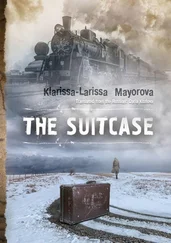Marina, engulfed in an easy chair, looked up from the “Visiting Lake George” brochure. But she was carsick the whole way up, she said.
Just don’t complain to me when she keeps you up all night.
A quarrel ensued, alleviating the existential disquiet. Esther won. They approached the king-size bed on the far end of which Frida was balanced like a glass half over a table’s edge. They stood above her, engulfed in a warm cloud of sleep. Go on, said Esther’s elbow. On being awoken, Frida gasped for air, convulsively catching her breath. Her gaze scaled the walls. No lilac wallpaper soup-streaked and lumpy from air bubbles, no drab macramé curtains, no glistening Russian tram slipping into the painting of a glistening Russian street. Frida’s long in-breath was interpreted, by both mother and grandmother, as a cue to exhale, but then she was seized by violent sobs. Marina barged into the hall. Esther smothered Frida’s tears with a breast and began to sing her favorite song — no, not the one about the orphan boy on the street after the war selling papirosi and not the one about the obese beauty with an elephant step, the other one about the swaying rowan tree and the tall oak that stand on opposite sides of the road never to meet.
• • •
THE FOLLOWING MORNING marked a momentous occasion: the Nasmertovs’ first encounter with freshwater. All their lives steeped in salt. It was nothing short of a rite of passage. First, however, they learned the meaning of the phrase in the vicinity and got to the bottom of the reasonable rate for the cabin: When Marina asked the elderly man at the reception desk how to walk to the lake, she got deadpan instructions for a four-hour trek along the highway.
Out of the car, the cash unloading commenced — they paid for parking, for day passes, for plastic chaise longues on the carpet of pebbly beach. At last they were paddling their arms and legs inside the square allotted for bathers. There would’ve been no harm were the square a bit bigger, the swimmers fewer. How much progeny did a single family require? They’d always considered one the ideal and two the limit. But here five, six, even seven children all addressed the same elderly lady as Mommy. At first the Nasmertovs thought they were observing an aberration, but after further observation they were able to recognize that the aberration was them. All those children! An ocean was a dominant force. Whoever partook of it was subservient, abiding an implicit understanding that it was letting you in and could just as easily rescind the invitation. But a lake was the bathtub of these snot-faced kids. After flopping around for two minutes, Marina remarked how difficult it was to stay afloat, and returned to her chaise.
Esther distributed bulki, stale white buns with an inedible crust that was softened by the damp heat from palms. Growing garrulous, she let slip that what she’d actually wanted to do for her birthday was see the Russian Marionette Theater. Obraztsov was performing in Millennium this week. It would probably be the last time he went on tour, considering he’s a thousand years old. Why hadn’t she said anything before? Well, she hadn’t wanted to stand in the way of their plans. But she did understand, didn’t she, that this was all being done for her? Maybe they could still get tickets, suggested Robert. If the vacation had to be cut short a day, so be it. Tonight’s the final performance, said Esther. The clouds went like this and like that, the bread got soggy in their fists.
Cotton balls had been stuffed into Marina’s cheeks. The corners of her lips pulled taut, the dark side of her eyeballs throbbed. Was it Esther’s remark about the marionettes? Was it that no one had thanked her for putting all this together? That no one even acknowledged the effort involved? Maybe it was that her thighs were now large enough to rub together when she walked and a few layers of skin had scraped off. She sat with her legs on either side of the chaise, letting the wounds breathe. It was probably general exhaustion — she hadn’t been sleeping much lately. Things called out to her in the night. Things? There were no distinctions such as animate/inanimate, living/dead, past/present — it had all gotten hopelessly jumbled into one mass, and at night this tumor of concerns called out to her in its indistinct voice. During the day you had appointments, papers to fill out, people to speak to. At night there was no one to address. Marina was being bothered, but there was no one to bother back. Everything ended with her, prone, unmoving. And she burped up the strangest, most disconcerting concoctions. She was ashamed and frightened of her dreams. And she certainly wasn’t sleeping the nine hours she used to claim that her body needed in order to function, as if she were a car that only took premium. If I get even an hour less, stay away, she’d warned. All exaggeration, it turned out. Now she regularly did with half that and was fine. Only hurt, terribly, overwhelmingly wounded and hurt, in giant wraparound sunglasses and a new one-piece that concealed her new flab. Her stomach wasn’t so bad, not yet, but all she had to do was look slightly to the left to see what it would look like in maturity. Esther’s belly stretched her swimsuit until the individual fibers were visible, the parts that hadn’t been dyed. Her black swimsuit petered to gray over the mound of stomach — the stomach that had wanted to tremble with laughter at the marionette theater in Millennium Hall.
• • •
ROBERT AND PASHA were getting the hang of it, their oars moving swiftly, in unison. Objects on the shore dwindled to insignificance as they leaned forward, leaned back, pumping their arms. Yes, they had arms! Those arms had biceps and triceps and all that stringy stuff. This had been Robert’s halfhearted suggestion, an idea nixed before uttered, and Esther, overhearing, experienced head-to-toe convulsions of mirth that didn’t stop until fat tears launched down her cheeks, and even then, wiping them away with her handkerchief, squealing in pain, she continued trembling with joy. Her allegiance was foremost to humor. Blunders, missteps, and odors were her comic fodder. People’s sensitivities, like their food allergies, were tiring. But by the time she was done appreciating the mental image of her husband and son manning a canoe, there was no chance they weren’t going to do it. Without a word Pasha followed his father’s lead to the rental station, claiming they weren’t in a position to turn down anything gratis.
Gliding farther out into the boundless lake, they were noticing superbly, noticing splotches of light dancing on the water’s metallic surface and how the clouds receded from their advance — OK, so there wasn’t much to notice, until the houses dotting the shoreline metamorphosed into mansions, each guarded by an obedient yacht. Such commodity fetishism wouldn’t have impressed them, but arduous teamwork and exposure to direct sunlight operated in conjunction to make a man inclined to be impressed. Look over there, said Robert, nodding toward four stories of architectural sleekness, glass walls, extraterrestrial sensibilities. And this one, said Pasha in reference to an ocher villa of palatial proportions. Pasha used his oar to push aside a turgid log. Robert steered them clear of rocky terrain. The sun drilled into their curly backs, extracting sweat. Shirts off, legs spread, breath labored. Conversations were initiated, but none stuck. Grunts and groans would have to suffice. Talk was superfluous. Sweat, toil, brotherhood.
The necessity of a major life change became glaring. Robert had always enjoyed working with his hands, pruning the garden, cracking walnuts, repairing the fence that one time. A primordial feature was activated. He became more spacious. The fog lifted from imaginary distances, extending the inner horizon. And he had an advantage. Levik may have been more naturally gifted in the handiwork department, but Robert didn’t have a tizzy the moment a switch failed to turn something on, no tantrum when a few bolts didn’t fit into place. He had no temper to lose. But everybody (Esther) ridiculed him whenever he set to tinkering with a broken contraption or went to do his sport (a set of torso twists and toe reaches performed on the boardwalk). A muffled clap of thunder in a distant valley set off the tremendous nature poetry of Tyutchev. The lake itself began a plangent recitation of Bunin’s “Returning from Nazareth” and “Summer Evening.”
Читать дальше












